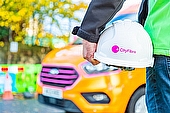Home > TV & Broadband > News > 3m mobile users mistakenly think they have 4G
3m mobile users mistakenly think they have 4G
Millions of people in the UK believe they are paying for 4G, when in fact they are still on 3G, Ofcom's latest communications market report reveals.

The regulator's Communications Market Report for 2014 found a discrepancy between the number of active 4G subscriptions and the number of people claiming to have 4G.
At the end of March 2014, operator data shows that there were six million 4G mobile subscriptions in the UK, around 8% of all mobile contracts.
However, an Ofcom survey conducted in April found that 12% of adults had 4G, an extra three million people.

"This difference is likely down to people over claiming," Ofcom say. In other words, either boasting about having the latest technology or really believing that they have 4G when they don't.
4G tariffs vs 4G handsets
In order for users to get superfast speeds, they need a 4G ready device, a 4G tariff and to be in a 4G area.
Most smartphones and tablets coming onto the market now are 4G ready. However, in order for the device to achieve these superfast speeds, it must also be connected to a 4G tariff.
The same applies the other way around. Anyone paying for a 4G tariff, but without a 4G ready phone, like the iPhone 4, won't be able to get the advertised speeds as the device isn't compatible.
A recent YouGov report found that 20% of current smartphone owners own a 4G ready handset, but are still on 3G. It could be this difference between 4G handsets and tariffs that is perplexing UK consumers.
Confusion over 4G benefits
The same YouGov study also found that a significant proportion of mobile users on a 3G tariff are not excited about what 4G can offer them.
Just over a fifth of users (22%) with 3G devices and less than a third (29%) of users with 4G handsets said they were excited about the capabilities of 4G.
What's more, around four in 10 3G users don't see the point in upgrading to the next generation of mobile technology.
Another survey from March found 54% of respondents were 'not interested' in switching to 4G.
This is also reflected in last week's Ofcom report which found no significant differences in the satisfaction levels of 4G and non 4G mobile users.

SOURCE: Ofcom Communications Market Report 2014. Available here.
Are the networks to blame?
So while it's obvious that a lot of people are confused about 4G technology but it's not clear why.
EE, the first network to roll out 4G in the UK, believes that it could be down to confusing advertising from rival networks.
For example, in June last year, Vodafone had branded McLaren Formula One cars with "Ultrafast 4G", despite the fact that they hadn't launched their 4G service yet.
Olaf Swantee, EE's boss, has also criticised Three for advertising their mobile broadband as '3.9G' before officially rolling out 4G in December 2013.
Coverage could be another issue.
EE currently have the widest coverage in the UK, with 70% of the population now living in an EE 4G area. However, the other three networks are still playing catch up.
It's important that users are aware of whether they have 4G coverage, because as well as needing a 4G tariff and 4G ready handset, users must be in a 4G area or they will revert to 3G.
Inevitable confusion
On the other hand, the Britons' fairly mild confusion over whether or not they have 4G might just be inevitable.
In January 2010, the British Video Association (BVA) released research that showed 6.5 million people, that's one in ten, thought that they were watching TV in HD even though they were missing at least one of the vital components.
In 2011, product manual site Retrevo, found that US consumers had a similar problem with understanding whether they had 4G. iPhone owners believed the iPhone 4 was a 4G device.
However, it wasn't just iPhone owners that found the whole data speed issue bewildering. 24% of Blackberry owners and 29% of Android users also believed that they had 4G devices.
While the people with Android devices could theoretically have had 4G - although it's unlikely they all did - Blackberry's owner at the time Research In Motion (RIM), didn't even have a 4G device on the market.
Get insider tips and the latest offers in our newsletter

We are independent of all of the products and services we compare.

We order our comparison tables by price or feature and never by referral revenue.

We donate at least 5% of our profits to charity, and we aim to be climate positive.
Latest News

11 December 2025
Virgin Media offer Meta Ray-Bans with TV bundles
11 December 2025
Government rules out ban on mid-contract price hikes
24 November 2025
CityFibre delivers full-fibre freedom to Hull with 30+ ISPsGet insider tips and the latest offers in our newsletter


